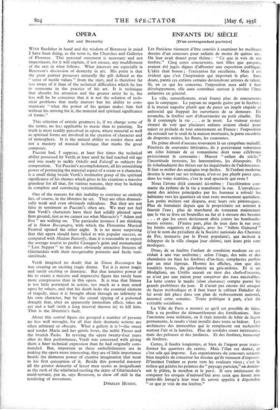OPERA
Art and Dexterity WITH Baedeker in hand and the wisdom of Berenson in mind I have been doing, as the term is, the Churches and Galleries of Florence. This personal statement is necessary and not impertinent, for it will explain, if not excuse, any muddlement of the arts in what follows. What interests me especially is Berenson's discussion of dexterity in art. His point is that the great painter possesses naturally the gift defined as the "sense of tactile values" from the start, and is therefore far less aware of it than of the technical difficulties which he has to overcome in the practice of his art. It is technique that absorbs his attention and the greater artist he is, the less will he be conscious that it is not the solution of tech- nical problems that really matters but his ability to com- municate "what the power of his genius makes him feel without his striving for it, the material and spiritual significance of forms."
This criterion of artistic greatness is, if we change some of the terms, no less applicable to music than to painting. Its truth is most readily perceived in opera, where material as well as spiritual forms are involved in the creation of character and of atmosphere. It is the natural ability to render these and not a mastery of musical technique that marks the great composer.
Puccini had, I suppose, at least five times the technical ability possessed by Verdi, at least until he had reached old age and was ready to tackle Othello and Falstaff as subjects for composition. Yet Puccini's accomplishment, all his astonishing power of portraying the material aspect of a scene or a character, is a small thing beside Verdi's instinctive grasp of the spiritual significance of his themes which gives to his creations a massive grandeur for all that, for various reasons, they may be lacking in complete and convincing verisimilitude.
One of the reasons for this inability to convince us entirely lies, of course, in the librettos he set. They are often dramati- cally weak and even obviously ridiculous. But _ they are not false in sentiment as Puccini's often are. We may not feel that Verdi's characters have their feet solidly planted upon firm ground, just as we cannot see what Massacio's " Adam and Eve" are walking on. The particular instance I am thinking of is Simon Boccanegra, with which the Florentine Musical Festival opened the other night. It is no more surprising that this opera should have failed to win popular success, as compared with Madam Butterfly, than it is reasonable to expect the average tourist to prefer Castagno's grim and monumental "Last Supper" to the more obviously attractive frescoes of Ghirlandaio with their recognisable portraits and facile veri- similitude.
Verdi imagined no doubt that in Simon Boccanegra he was creating an exciting tragic drama. Yet it is never tragic and rarely exciting or dramatic. But that intuitive power of his to create a massive and impressive figure has rarely been more conspicuous than in this opera. It is true that Simon is too little portrayed in action, too much as a man acted upon by others, and that his death lacks the essential element of tragedy, since it is brought about through no infirmity in his own character, but by the casual sipping of a poisoned draught that, after an apparently immediate effect, takes an act and a half (with a long interval thrown in) to kill him. That is the librettist's fault.
About this central figure are grouped a number of persons no less well wrought, for all that their dramatic actions are often arbitrary or obscure. What a gallery it is !—the sweet and tender Maria and her gentle lover, the noble Fiesco and the brutish Paolo. In revising the opera twenty-four years after its first performance, Verdi was concerned with giving them a finer technical expression than he had originally com- manded. But, important as these embellishments are in making the opera more interesting, they are of little importance beside the immense power of creative imagination that went to his first conception of it. Beside this powerful mastery all the greater dexterity of lesser men seems as insignificant as the rush of the whirlwind rustling the skirts of Ghirlandaio's maid-servant, put in, says Berenson, to show off skill in the rendering of movement.
DYNELEY HUSSEY,


































































 Previous page
Previous page